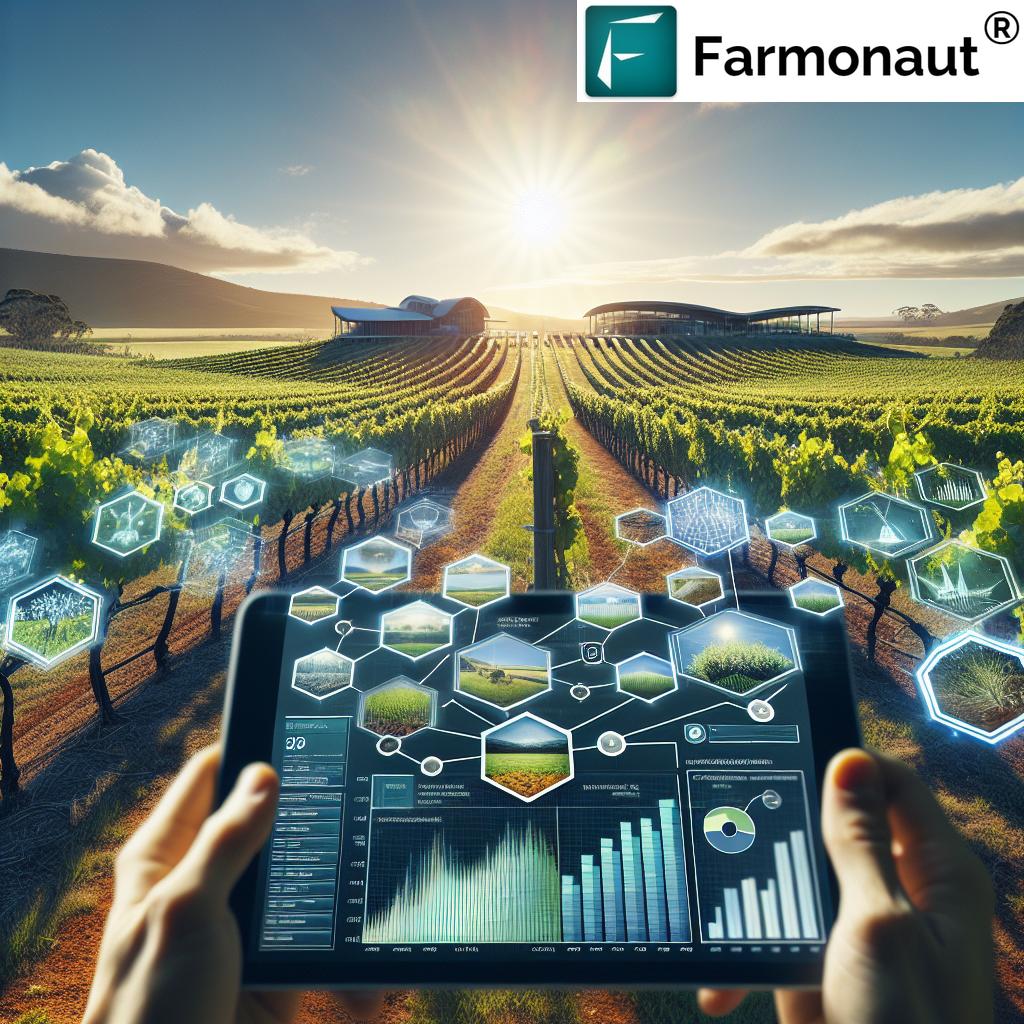Revolutionizing Australian Wine Exports: GIS-Driven Sustainable Winegrowing Insights for 2025
“Australian wine exports to China dropped by 97% in 2021, reshaping the industry’s global market strategy.”
Welcome to our comprehensive exploration of the future of Australian wine exports and sustainable winegrowing practices. As we look towards 2025, we’re excited to share the latest trends, innovations, and market insights that are shaping the industry. From the vineyards of South Australia to the bustling markets of Europe and Asia, we’ll uncover how Geographic Information Systems (GIS) and precision agriculture are revolutionizing viticulture and wine production.

The Changing Landscape of Australian Wine Exports
The Australian wine sector has long been a significant player in the global market. However, recent geopolitical shifts have dramatically altered the export landscape. The substantial drop in exports to China has forced the industry to pivot, seeking new opportunities and strengthening relationships in alternative markets.
- Europe: Renewed focus on traditional markets like the United Kingdom and emerging Eastern European consumers
- Americas: Expanding presence in the United States and exploring growth in Canada and South America
- Asia: Diversifying beyond China to markets like Japan, South Korea, and Southeast Asian countries
To navigate these changes, Australian winegrowers and exporters are leveraging cutting-edge technologies and sustainable practices to maintain their competitive edge. This is where GIS and precision agriculture come into play, offering unprecedented insights into vineyard management and wine production.
GIS in Viticulture: Precision Agriculture for Vineyards
“GIS-driven precision viticulture can reduce water usage in vineyards by up to 30%, promoting sustainable winegrowing practices.”
Geographic Information Systems (GIS) are revolutionizing the way we approach vineyard management. By integrating satellite imagery, soil data, and climate information, GIS enables winegrowers to make data-driven decisions that optimize grape quality and yield while minimizing resource use.
Key Applications of GIS in Viticulture:
- Soil Mapping: Detailed analysis of soil composition and variability across vineyards
- Microclimate Monitoring: Tracking temperature, humidity, and sunlight exposure at a granular level
- Water Management: Precision irrigation systems that deliver water exactly where and when it’s needed
- Pest and Disease Control: Early detection and targeted treatment of vineyard threats
At Farmonaut, we’re proud to be at the forefront of this technological revolution. Our satellite-based crop health monitoring system provides real-time insights into vineyard health, helping Australian winegrowers make informed decisions about irrigation, fertilizer usage, and pest management.
Sustainable Winegrowing: A Path to the Future
Sustainability is no longer just a buzzword in the wine industry; it’s becoming a core business strategy. Australian winegrowers are increasingly adopting climate-smart practices to ensure the long-term viability of their vineyards and meet growing consumer demand for environmentally responsible products.
Sustainable Practices Gaining Traction:
- Carbon Footprint Reduction: Implementing energy-efficient winery operations and sustainable packaging
- Organic and Biodynamic Farming: Minimizing chemical inputs and promoting biodiversity
- Water Conservation: Adopting drought-resistant grape varieties and advanced irrigation techniques
- Waste Management: Implementing circular economy principles in wine production
Farmonaut’s carbon footprinting feature is helping wineries track and reduce their environmental impact, providing real-time data on emissions and supporting compliance with environmental regulations.
Wine Tourism: A Growing Opportunity
As the global travel industry rebounds, wine tourism presents a significant opportunity for Australian winegrowers. By combining unique vineyard experiences with sustainable practices, wineries can attract visitors and create additional revenue streams.
Enhancing Wine Tourism with Technology:
- Virtual Reality Tours: Offering immersive experiences of vineyards and winemaking processes
- Interactive Tasting Rooms: Using digital technology to educate visitors about wine varieties and production methods
- Sustainable Wine Trails: Showcasing eco-friendly practices through guided tours and experiences
Our Jeevn AI Advisory System at Farmonaut can help wineries optimize their visitor experiences by providing real-time data on weather conditions and vineyard health, enhancing the educational aspect of wine tourism.
International Market Insights: Navigating Global Demands
Understanding the nuances of different international markets is crucial for successful wine exports. Each region has its own regulatory systems, labeling requirements, and consumer preferences that Australian winegrowers must navigate.
Key Markets and Considerations:
- European Union: Stringent regulations on geographical indications and organic certification
- United States: Complex distribution systems and varying state-level regulations
- Asia: Growing demand for premium wines and importance of cultural sensitivity in marketing
Farmonaut’s blockchain-based traceability solutions can play a crucial role in meeting international regulatory requirements and building consumer trust in Australian wines.

Climate Change Adaptation: Preparing for 2025 and Beyond
Climate change poses significant challenges to the wine industry, affecting grape quality, harvest timing, and overall vineyard management. Australian winegrowers are at the forefront of developing innovative strategies to adapt to these changes.
Climate Adaptation Strategies:
- Varietal Selection: Experimenting with grape varieties that are more resilient to changing climate conditions
- Canopy Management: Adjusting vineyard layouts and trellising systems to manage sun exposure and heat stress
- Precision Viticulture: Using GIS and sensor technologies to micro-manage vineyard conditions
- Water Management: Implementing advanced irrigation systems and water recycling techniques
Farmonaut’s satellite-based monitoring system is instrumental in helping winegrowers track and respond to changing climate conditions, ensuring the long-term sustainability of their vineyards.
Australian Wine Export Market Overview (2025 Projections)
| Export Market | Projected Export Volume (million liters) | Estimated Market Value (AUD millions) | Key Sustainability Practices | GIS/Precision Agriculture Adoption Rate (%) | Climate Adaptation Score (1-10) | Wine Tourism Potential |
|---|---|---|---|---|---|---|
| China | 50 | 300 | Water conservation, organic farming | 40 | 7 | Medium |
| Europe | 200 | 1,500 | Carbon neutrality, biodiversity promotion | 75 | 8 | High |
| Americas | 150 | 1,200 | Sustainable packaging, energy efficiency | 60 | 7 | High |
| Asia (excluding China) | 100 | 800 | Precision viticulture, waste reduction | 55 | 6 | Medium |
| Oceania | 30 | 200 | Regenerative agriculture, water recycling | 80 | 9 | High |
Innovations in Vineyard Management
The integration of advanced technologies is transforming vineyard management practices, leading to more efficient and sustainable wine production.
Cutting-Edge Vineyard Technologies:
- Drone Mapping: High-resolution aerial imagery for precise vineyard analysis
- IoT Sensors: Real-time monitoring of soil moisture, temperature, and vine health
- AI-Powered Predictive Analytics: Forecasting optimal harvest times and potential pest outbreaks
- Robotic Pruning and Harvesting: Reducing labor costs and improving efficiency
Farmonaut’s platform integrates seamlessly with these technologies, providing a comprehensive solution for modern vineyard management. Our API allows for easy integration with existing farm management systems, enhancing the overall efficiency of wine production.
Explore Farmonaut’s API Solutions
The Role of Research and Development
Continuous innovation is key to maintaining Australia’s position as a leader in the global wine industry. Significant investments in research and development are driving advancements in viticulture, winemaking, and sustainability.
Key Research Areas:
- Grape Genetics: Developing varieties resistant to drought and disease
- Fermentation Science: Exploring new techniques to enhance wine flavors and quality
- Sustainable Packaging: Innovating eco-friendly bottle and label materials
- Precision Viticulture: Advancing GIS and remote sensing technologies for vineyard management
Farmonaut is proud to collaborate with leading research institutions, providing valuable data and insights to support ongoing studies in precision agriculture and sustainable viticulture.
Access Farmonaut’s API Developer Docs
Building a Sustainable Future for Australian Wine
As we look towards 2025 and beyond, the Australian wine industry is poised for a sustainable and technologically advanced future. By embracing GIS-driven precision viticulture, adopting climate-smart practices, and leveraging innovative technologies, Australian winegrowers are setting new standards for quality, efficiency, and sustainability in wine production.
The challenges posed by changing global markets and climate conditions are significant, but they also present opportunities for innovation and growth. With a continued focus on research, sustainability, and market adaptation, Australian wines are set to maintain their world-class reputation and expand their global presence.
Embracing Digital Solutions for Wine Export Success
In the rapidly evolving landscape of wine exports, digital tools and platforms play a crucial role in streamlining operations, enhancing traceability, and connecting with global markets. Farmonaut’s suite of digital solutions is designed to support Australian winegrowers and exporters at every stage of their journey.
Digital Tools for Wine Export Success:
- Satellite-Based Crop Monitoring: Real-time insights into vineyard health and productivity
- AI-Powered Advisory Systems: Personalized recommendations for optimal vineyard management
- Blockchain Traceability: Ensuring transparency and authenticity in the wine supply chain
- Data Analytics Dashboards: Comprehensive overviews of production, exports, and market trends
By leveraging these digital tools, Australian wine exporters can make data-driven decisions, ensure product quality, and respond quickly to changing market demands.
FAQ: Australian Wine Exports and Sustainable Winegrowing
Q: How is GIS technology improving wine production in Australia?
A: GIS technology enhances vineyard management by providing detailed insights into soil conditions, microclimate variations, and crop health. This enables precise interventions, optimizing grape quality and yield while reducing resource use.
Q: What are the main challenges facing Australian wine exports in 2025?
A: Key challenges include adapting to climate change, navigating shifting global markets (especially post-China trade disruptions), meeting increasing sustainability demands, and competing in a crowded international market.
Q: How are Australian winegrowers addressing climate change?
A: Australian winegrowers are adopting climate-smart practices such as water-efficient irrigation, planting drought-resistant varieties, adjusting canopy management, and using precision viticulture techniques to mitigate and adapt to climate change impacts.
Q: What role does wine tourism play in the Australian wine industry?
A: Wine tourism is becoming increasingly important, offering wineries additional revenue streams, enhancing brand loyalty, and providing opportunities to educate consumers about Australian wines and sustainable practices.
Q: How is blockchain technology being used in the wine industry?
A: Blockchain is used to enhance traceability in the wine supply chain, verifying the authenticity and origin of wines. This technology helps combat fraud, ensures quality control, and builds consumer trust, especially in international markets.
Conclusion: A Bright Future for Australian Wine Exports
As we look towards 2025, the Australian wine industry stands at the cusp of a new era, driven by technological innovation, sustainable practices, and a deep commitment to quality. The challenges posed by changing global markets and climate conditions are significant, but they have also spurred unprecedented levels of innovation and adaptation.
By embracing GIS-driven precision viticulture, adopting climate-smart practices, and leveraging advanced technologies like those offered by Farmonaut, Australian winegrowers are not just responding to challenges – they’re setting new global standards for quality, efficiency, and sustainability in wine production.
The future of Australian wine exports is one of resilience, innovation, and sustainability. As the industry continues to evolve, it will undoubtedly maintain its world-class reputation while expanding its global presence, offering wine enthusiasts around the world a taste of Australia’s rich viticultural heritage and innovative spirit.
We invite you to be part of this exciting journey. Whether you’re a winegrower, exporter, or simply a wine enthusiast, stay connected with the latest developments in Australian wine and sustainable agriculture through Farmonaut’s comprehensive suite of tools and resources.
Cheers to the future of Australian wine!






